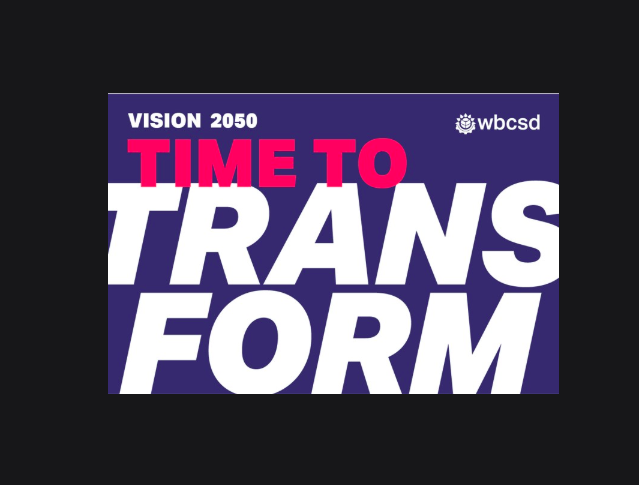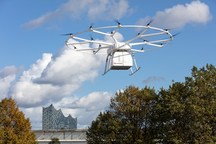Leading multinational companies set urgent action agenda for all people to live well, within planetary boundaries
The World Business Council for Sustainable Development (WBCSD) and more than 40 major global companies
Nine pathways to action across industries to ensure a more sustainable, prosperous future
Chennai, NFAPost: The world faces three critical challenges: the climate emergency, nature loss and mounting inequality.
The Covid-19 pandemic has illustrated that these challenges are interconnected and that our systems are ill-prepared for shocks. As global risks continue to build, business leaders are rallying behind a bold and urgent transformation agenda developed by the World Business Council for Sustainable Development (WBCSD), a CEO-led organisation of over 200 leading companies.
Vision 2050: Time to Transform sets a shared vision of a world in which more than 9 billion people are able to live well, within planetary boundaries, by 2050.
To achieve this vision, all stakeholders need transformation at scale, and business needs to focus its actions on the areas through which it can best lead the systems transformations.
Vision 2050: Time to Transform maps how systems transform and lay out a new framework to guide business action in the decade ahead.
Financial product
At the heart of this framework are nine transformation pathways – actionable routes for companies to take – covering the areas of business activity that are essential to society: energy; transportation and mobility; living spaces; products and materials; financial products and services; connectivity; health and wellbeing; water and sanitation; and food.
The vision and transformation pathways are aligned with the Sustainable Development Goals (SDGs) and the targets of the Paris Agreement.
Each of the nine transformation pathways contains ten action areas for the decade ahead, designed to help companies drive transformative change in their strategies, business operations and impact on society.
To move beyond business-as-usual into the accelerated transformations necessary, business leaders must adopt three mindset shifts: reinventing capitalism that rewards true value creation; focusing on building long-term resilience and taking a regenerative approach beyond doing no harm.
System transformation
While a business can take a leading role, it must work on and design systems transformations, together with scientists, policymakers, financiers and investors, innovators and consumers.
Only collaboration at unprecedented levels will create the impact and speed needed to achieve all people living well within planetary boundaries by 2050.
WBCSD President and CEO Peter Bakker said Vision 2050: Time to Transform should not be read with the idea that tomorrow is going to be much the same as today.
“This is a report for change, starting now, outlining how a business needs to play a leading role. We have no time to waste. Achieving this vision requires a wholesale transformation of everything we have grown up with: energy needs to decarbonize; materials need to go circular; food needs to be produced sustainably and equitably and provide healthy diets”, said Peter Bakker.
Mindset shift
Peter Bakker said humanity’s future depends on transformation. “One of the keys to success will be a mindset shift around capitalism. Our economic systems, incentives, global accounting standards and capital market valuations can no longer just be based on the financial performance of businesses: we must integrate our impact on people and planet as part of how we define success and determine enterprise value,” said Peter Bakker.
The report’s foreword, signed by 42 top executives from WBCSD member companies, makes a collective call to global business, stressing: “Business can lead. Business can forge the collaborations required to drive change. It can… but more than that, it must. It is in business’s interest to pursue the transformations set out in Vision 2050 – because its long-term success depends on thriving societies to trade with, and a healthy planet for us all to exist on.”
The launch of Vision 2050 follows the announcement in October 2020, that WBCSD, together with members, raised the bar of business commitment to sustainability through a set of new criteria put forward as part of WBCSD’s membership conditions. The new criteria also focus on the top three priority sustainability challenges that our society faces: climate emergency, nature loss and inequality.
Corporate governance
Additionally, WBCSD expects its member companies to strive to the highest standards in corporate governance and transparency, aimed at enhancing the comparability of data for investors and other stakeholders. Over the coming months and years, WBCSD will continue working together with its members and partners to realize the required transformations and “getting sustainability done”.
“The COVID-19 pandemic has brought vulnerabilities to the surface, underscoring just how fragile and interdependent many of our most vital systems are. Despite its enormous human and financial cost, the pandemic has also created an opportunity to drive and accelerate change at a completely different pace. We now have a unique but rapidly closing window of opportunity for action – it is time to transform our businesses and societies.” Nadir Godrej – Managing Director, Godrej Industries Limited
WBCSD member companies that engaged in the development of Vision 2050: Time to Transform were: 3M, ACCIONA, Arcadis, ArcelorMittal, BASF, Bayer, Chanel, DNV, DSM, EDF Group, ENGIE, ERM, EY, Fujitsu, Givaudan, Godrej Industries, Henkel, IFF, Inter IKEA Group, Microsoft Corporation, Mitsubishi Corporation, Natura, Neste Corporation, Nestlé, Olam International, PwC, Rabobank, Banco Santander, Shell, Sompo Japan Insurance Inc., SONAE, Syngenta, The Navigator Company, Toyota Motor Corporation, Unilever, Vale, Volkswagen, and Yara.
Vision 2050
Vision 2050: Time to Transform is supported by a range of deep-dive issue briefs, practical toolkits and other promotional resources, all of which are freely available via the Vision 2050 website.
Vision 2050 was originally launched by WBCSD in 2010 as part of a landmark report that explored what a sustainable world would look like, how such a world could be created, and the role business should play in bringing it about. Ten years on, WBCSD and its member companies jointly updated this work. Together, the group created this practical framework for the critical decade ahead, to help companies drive transformative change in their sustainability planning and business strategies.
Vision 2050’s transformation pathways: Vision 2050’s nine transformation pathways represent the essential products and services that societies need, and that business exists to provide.
Each pathway includes a vision of the way that particular societal needs should be met in 2050, a series of transitions considered critical to achieving each vision, with 10 action areas for business for the next decade. These pathways and their corresponding visions are:
- Energy: a sustainable energy system providing reliable and affordable net-zero carbon energy for all.
- Transportation and mobility: safe, accessible, clean and efficient transportation of people and goods.
- Living spaces: healthy and inclusive living spaces, thriving in harmony with nature.
- Products and materials: resource use is optimized to meet society’s needs while allowing the systems that provide resources to regenerate.
- Financial products and services: all financial capital and financial products and services are mobilized to support sustainable development.
- Connectivity: responsible connectivity brings people together, enhances transparency and efficiency, and drives access to opportunity.
- Health and wellbeing: the highest attainable standard of health and wellbeing for everyone.
- Water and sanitation: thriving aquatic ecosystems that support food, energy and public health for all.
- Food: a regenerative and equitable food system producing healthy, safe and nutritious food for all.
WBCSD is a global, CEO-led organization of over 200 leading businesses working together to accelerate the transition to a sustainable world. WBCSD helps make member companies more successful and sustainable by focusing on the maximum positive impact for shareholders, the environment and societies.
Combined revenue
The organisation’s member companies come from all business sectors and all major economies, representing a combined revenue of more than $8.5 trillion and 19 million employees.
Its global network of almost 70 national business councils gives our members unparalleled reach across the globe. Since 1995, WBCSD has been uniquely positioned to work with member companies along and across value chains to deliver impactful business solutions to the most challenging sustainability issues.
Together, WBCSD is the leading voice of business for sustainability: united by its vision of a world where more than 9 billion people are all living well, within planetary boundaries, by 2050.





